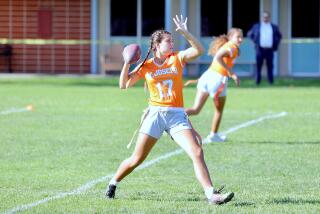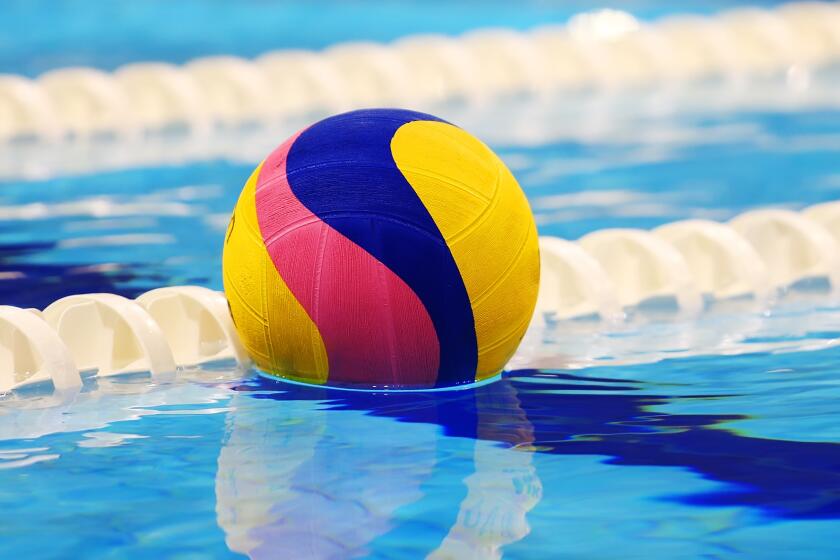Loyola Student Is Battling the NCAA in Running Dispute
Bonnie Frankel has encountered adversity throughout her life.
She is dyslexic, had a double mastectomy in the 1970s and recently went through a divorce.
Now, at 46, Frankel wants to compete for Loyola Marymount’s cross-country team, but the NCAA won’t let her.
Frankel ran track at Santa Monica City College last year and received an associate of arts degree from the school. She enrolled at Loyola this fall and thought she had three years of eligibility left.
The NCAA however, told her otherwise. A 1961 rule states that Division I athletes have five years to complete four. The problem is Frankel attended Santa Monica College full-time for a semester in the fall of 1962.
“Clock-time begins at the time of enrollment in a collegiate institution,” said Steve Mallonee, NCAA director of legislative services. “The only exceptions are military or official church mission. We also grant one-year extensions for Olympic-type activities or for pregnancy.”
Frankel and Loyola believe an exception should be made in her case.
They argue that women’s athletics were not governed by the NCAA when Frankel enrolled at Santa Monica in 1962. Women’s athletics were governed by the Assn. of Intercollegiate Athletics for Women until 1981. According to the NCAA, Frankel’s Division I eligibility expired in 1967.
“That’s a legitimate question, but we’ve taken the same position in other cases of similar nature,” said Richard Perko, the NCAA legislative assistant who handled the Frankel case. “We can’t go by rules that applied then. We have to go by rules that apply now.”
Another argument is that Santa Monica did not have intercollegiate sports program for women in 1962. Since most universities did not offer an intercollegiate sports program, her options for competing elsewhere were virtually nonexistent. Because of that, Frankel believes the NCAA rule should not apply to her.
“It bothers me that they’re saying, ‘You can’t do something,’ without validating why,” said the 5-foot-1, 93-pound Frankel. “They’re applying a law that didn’t govern women’s sports. It governed men’s sports.”
Frankel says Loyola is the perfect place for her to compete because it has a non-scholarship cross-country program. The Lions usually struggle in the West Coast Conference, where they compete against scholarship programs such as Gonzaga, Portland and St. Mary’s.
Bill Moebs, Loyola’s faculty representative in charge of checking athletes’ eligibility, says Perko wasn’t even aware that Loyola had a cross-country team.
“I think in this case they’re letting the rules get in the way of common sense,” said Moebs, a physics professor at Loyola. “The rule is really getting in the way here.”
WCC Commissioner Michael Gilleran agrees with Moebs. He says there is no harm in allowing Frankel to run at Loyola. According to cross-country Coach Mike Sheehan, Frankel would be one of the Lions’ top five runners.
“I doubt if anybody anywhere would lose any sleep if this 46-year-old woman would run cross-country at Loyola,” Gilleran said. “It’s unfortunate and I do feel for her because she really wants to do it.”
But Mallonee says the NCAA can’t look at every case individually. The rule must apply to everyone.
“It’s been in effect for a long time because the NCAA doesn’t have a committee that has the authority to make exceptions,” he said. “We don’t get this too often. The number of people that want to come back and play in their 40s is about two a year. We direct those people to Division II or Division III and they’re happy there.”
Frankel isn’t willing to switch schools. She chose Loyola for its academics. She also selected it because its small enrollment (3,900) would allow one-on-one interaction with professors that could benefit her impaired reading ability.
“I love it here. I want to go to law school,” Frankel said. “These kids have helped me grow.”
Frankel took up running in 1988, shortly after her divorce. In 1990, she enrolled at Santa Monica and took a track class with a friend. That’s when Santa Monica track Coach Tommie Smith spotted her and asked her to try out for the team. Frankel competed in the 3,000 and 5,000 meters.
“Raw, very good, but raw. She’s very willing and she’s a very hard worker,” said Smith, a gold medalist in the 200 meters at the 1968 Olympics. “For somebody that age she’s great. She should try out for the Masters.”
Frankel runs about 50 miles a week near her Santa Monica home. But she says it’s not the same as practicing in a team environment. Her 14-unit class load makes it difficult to schedule workouts.
Frankel plans to keep fighting the NCAA because running has become an important part of her life. Last week she hired an attorney to reappeal her case.
“I think you should fight for things you believe in,” Frankel said. “Running makes my brain think faster. It’s like therapy for me and here I get denied the right to do it.”
More to Read
Get our high school sports newsletter
Prep Rally is devoted to the SoCal high school sports experience, bringing you scores, stories and a behind-the-scenes look at what makes prep sports so popular.
You may occasionally receive promotional content from the Los Angeles Times.






